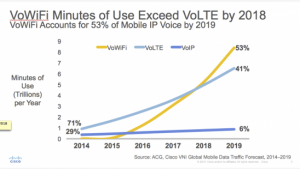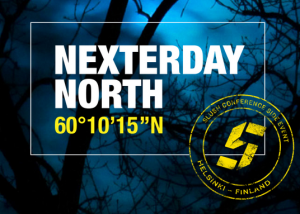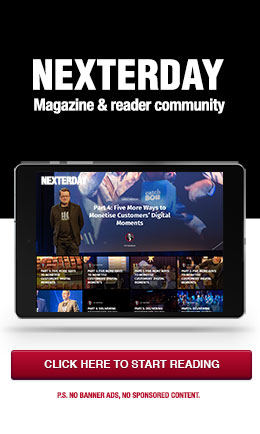Posted: September 16th, 2015 | Author: Simo Isomaki | Filed under: Telecom Trends | Tags: 4G, VoIP, VoLTE, VoWiFi | Comments Off on Weighing the Pros & Cons of VoLTE
 There has been a lot of interest around Voice over LTE (VoLTE) lately, not to mention thorough analyses on the benefits of the technology and recorded rollout activities across the globe.
There has been a lot of interest around Voice over LTE (VoLTE) lately, not to mention thorough analyses on the benefits of the technology and recorded rollout activities across the globe.
According to the Global mobile Suppliers Association (GSA), there are as many as 16 VoLTE launches in seven countries, as operators look to embrace HD voice. In a press release and as noted in FierceWirelessEurope, Alan Hadden, VP of research at the GSA, said: “Interest in VoLTE has surged, and [more than] twice as many operators are investing in VoLTE compared to a year ago. Many more launches will happen in 2015.”
Despite VoLTE’s success thus far and its growing number of deployments, uncertainties around the technology remain.
First, there is the required handset support for VoLTE. Based on studies done by tefficient, surprisingly few of the 4G handsets on the market are equipped for the technology since early implementations of VoLTE were based on partial standards or proprietary solutions. VoLTE works best for operators like those in Korea, Japan and the United States that have full control over handset distribution.
Second, VoLTE support in networks is still implementation-specific, meaning that calling from one network to another using VoLTE might not be possible—even in the same country. As an indication of the complexity, VoLTE roaming is only just starting to happen. KPN claimed the world’s first case as late as in October 2014.
For operators who haven’t had full control over handset distribution, the solution might currently have to be as harsh as making sure that customers joining them replace their handset—even if it’s 4G—with one that the operator knows has the right combination of hardware, firmware and software to function in their VoLTE network.
So while VoLTE is a relatively new, emerging technology—a richer multimedia voice and video call service based on IMS—the question is: is it a MUST for digital and communications service providers? They must thoughtfully consider this question because, if they are not going to take it onboard, they are about to lose their lucrative and long-lasting, but currently declining traditional voice revenue.
This was recently confirmed in The Guardian. As written in the article, Paul Lee, head of technology, media and telecommunications research at Deloitte, said that VoLTE—phone conversations carried over the data connection of a 4G network, which are of higher quality and can be switched from an audio call to a video call—are likely to supplant traditional phone calls over the next decade.
Another common concern and question is Voice over IP (VoIP) as VoLTE or VoIP in another means. Take VoIP services like Skype, Viber and WhatsApp. VoLTE goes beyond these in aspects like being able to handle radio networks’ handover and support emergency calls. The technology also promises superior voice quality. But are Generation Cloud customers willing to pay extra for this? It’s highly unlikely.
So, if VoLTE supplants traditional phone calls, will it significantly improve operators’ business by presenting a revenue boost for voice? Again, this is highly unlikely. Based on the VoLTE services on the market thus far, it seems that these voice calls are charged similarly to ordinary ones, where video comes on top in form of data charging.

Source: Cisco Blog
Here comes the interesting expansion of the voice business, which VoLTE indirectly enables: native Wi-Fi calling (or Voice over Wi-Fi or VoWiFi). Every cellular network—no matter how good it is—will have coverage issues indoors. In most cases, there’s Wi-Fi coverage to act as support.
With native Wi-Fi calling, mobile customers will seamlessly carry calls over existing Wi-Fi when there is no cellular coverage. Similarly to VoLTE, these calls are charged as any regular voice call, but here we are talking about a call that could not have happened without Wi-Fi. Consequently, it means additional voice revenue for the operator (or it could mean unlimited voice plans become more frequent). The same IMS handles both VoWiFi and VoLTE—with the latter technology being a pre-requisite for handover to happen between VoWiFi and cellular. (If you don’t have cellular indoor coverage, you obviously need to be able to move in and out of your house without dropping calls.)
With this in mind, we should stop looking at VoLTE in isolation and instead consider VoLTE in tandem with VoWiFi.
VoLTE also offers huge potential for cost-savings. When voice and other services are converged on LTE, and when customers have fully bought into them, digital and communications service providers are able to shut down their circuit-switched 2G and 3G networks. This will have a huge impact on operators’ profitability.
So do digital and communications service providers possess the knowledge and assets for what it takes to launch VoLTE successfully? We’ll discuss this in a coming blog post—please stay tuned.
Malla Poikela of Comptel co-wrote this blog post entry.
Posted: September 14th, 2015 | Author: Special Contributor | Filed under: Events | Tags: Comptel, Nexterday North, Operation Nexterday | Comments Off on Join Us at Nexterday North: A Can’t-Miss Speaker Lineup
 By Ville Tolvanen, Digitalist Network, @VilleTolvanen
By Ville Tolvanen, Digitalist Network, @VilleTolvanen
This November, I will join some of the world’s best and brightest minds in Helsinki for Comptel’s Nexterday North. Taking place 9-10 November – two days before the massive startup conference Slush – Nexterday North will be a non-traditional venue where enterprises, digital and communications service providers and everyone in between can learn, grow and be inspired. You can register for the show at this link.
The event will motivate operators, in particular, to start thinking differently about their organisation and the world around them. As we discuss in the Digitalist Network, digitalisation is having an incredible impact on businesses and everyday people alike. That creates a huge opportunity for to appeal and cater to their customers and peer networks.
Nexterday North’s speakers will show you exactly how to take action, and as moderator of the event, I’m thrilled to have a first-row seat. Here are a few keynote speakers who I am personally excited to hear from at Nexterday North.
 Patrick Dixon
Patrick Dixon
As a renowned futurist, Patrick is one of the business world’s leading thinkers. He is able to paint a picture of how global change calls for disruptive new business strategies, as described in his latest book, The Future of Almost Everything. He also happens to be an engaging keynote speaker, and the crowd at Nexterday North can expect to hear a radical vision for the future of business and technology.
 Mårten Mickos
Mårten Mickos
Mårten is a truly disruptive voice in the world of business. He encourages corporations to step outside their comfort zones and re-imagine how they manage and motivate teams. His track record speaks for itself: as the former CEO of MySQL and Eucalyptus and now a senior vice president for HP’s Cloud division, Mårten continues to demonstrate how global enterprises can succeed with a top-down, digitally enabled, culture-driven management style.
 Linda Liukas
Linda Liukas
Linda’s story is inspiring. As the founder of Rail Girls, she developed global volunteer workshops that taught the foundations of computer programming to more than 10,000 women in more than 160 cities. She also wrote Hello Ruby, a remarkable children’s book that makes learning technology, computing and coding fun and exciting for kids. Linda has a creative mind and an artist’s flair, and she’s setting the course for the present and future of programming. You can’t miss her keynote!
 Gary Vaynerchuk
Gary Vaynerchuk
Gary Vee is everywhere – he runs VaynerMedia (one of the world’s top 10 social media agencies according to AdAge) and Vayner/RSE, a top technology investment firm. He also writes books, hosts the #AskGaryVee web series and launched online retailer Wine Library. To put it simply, he is an absolute maven when it comes to marketing and running successful online businesses. Gary will appear by video presentation, I’m thrilled he will be able to share his expertise.
 Kjell Nordström
Kjell Nordström
If you want to know how your businesses can thrive in a radically changing corporate world, you need to hear from Kjell. He has been one of the world’s leading voices on the global economy, publishing several books that describe what it takes to succeed in today’s challenging business environment. His speeches have been called thought-provoking, entertaining and inspiring, and he is sure to offer Nexterday North attendees a roadmap for business transformation.
Nexterday North will be unlike any other conference you go to this year. I invite you to join me and the rest of the event’s speakers for what will be an exciting week in Finland. Register for Nexterday North here.
Posted: September 9th, 2015 | Author: Jani Virkkula | Filed under: Events | Tags: Nexterday North | Comments Off on 5 Reasons You Have a Latitude Problem If You’re Thinking About Coming To Nexterday North
So you’re thinking about attending Nexterday North, touted to be the antiseminar you’ve been waiting for and taking place on 9-10 November 2015, in Helsinki, Finland? It’s supposed to host an impressive list of keynote speakers, look at the telecommunications business landscape with a non-traditional mindset and combine cross-business insights, deep industry focus and the drive of the most ambitious startups in the world. Well think ahead, think again, think beyond and you’ll quickly understand why Finland is perhaps not the best place to be at this particular time.
1. You’ll See Helsinki, But Only From Indoors
Helsinki averages approximately 40 hours of sunshine for the entire month of November. Think about that for a while. The best the local weather has to offer is loads of sleet, piles of slush and streets full of virtually invisible black ice. Oh, and temperatures near or below zero degrees Celsius. To top it all, the venue is an old warehouse by the docks! How the heck do you occupy yourself in conditions like that? You’ll have no choice but to listen to some of the smartest people in the world share their radical ideas for the future of our business, and what’s worse, you might actually contribute, learn something new and meet interesting new people. Who wants that?
2. The Collective Blind Spot Is My Comfort Zone
Aren’t you already sick and tired of hearing about stepping outside your comfort zone? There’s a reason why it is comfortable: you’ve carved your niche, made your mark there and know the rules of the game inside out. There’s nothing wrong with sticking to your guns, right? The same goes for this “collective blind spot” nonsense. Let’s face it. It is just another marketing term trying to package someone else’s blind spot and sell it as an innovation to a new reference group. It doesn’t matter if this message is delivered by some of the most creative, proven and successful industry disruptors. You know, people like Gary Vaynerchuk, Mårten Mickos, Matthew Rosenquist or Ted Matsumoto. The grass is not greener on the other side of the fence. At least not in November in Helsinki.
3. This Startup Trend Is Short-Lived Anyway
And talking about grass. We all know startups come and go. They are like blades of grass in a tornado: completely at the mercy of the elements. Sure, they sprout when the weather is fair and the sun puts the focus on them but when’s the last time you’ve heard about a startup that truly reshaped any industry landscape? Just look at Slush and their roster! Not many game-changers there, right? By the way, forget about hoping to see any grass in Helsinki in November. Even if by some miracle it were growing, it’d still be too dark to see anything.
4. ImpacTalk Sessions and Industry Blueprint Alley Are Not Right Up Your Alley
So somebody built an always-on ecosystem gallery introducing innovative and field-proven blueprints created by industry leading companies serving digital and communications service providers? Ecosystem sounds like hippie stuff. How about the ImpacTalks? They claim to be breakout sessions full of insightful, executable and field-proven insights about growth. Don’t be fooled by the description! It’s all about strong-arm tactics and about “offers you cannot refuse.” Yeah, that’s going to make an impact alright. Just like the sleet hitting your face in Helsinki in November.
5. So Much Fun, It May Kill You
So which is it? Fun or professional? Decide already! We all know you cannot combine a professional, industry-changing event with fun and games. If you’re having fun, you’re not learning anything useful and if you’re learning something, I’ll be damned if it is fun. I’d bet good money that there’s going to be a party at the event. Figures! The rumor also has it that the happy hour is going to legendary, and you know what they say about them, right? “Happy hour today is a crappy hour the day after!” This is a serious obstacle to true learning and development, which can only occur in a serious environment. In a party you just interact with a lot of people in a laidback manner, network your butt off with the best minds in (and outside) the industry and – what’s worse – don’t sit quietly with a stern look on your face. As stern as the weather in Helsinki in November.
So don’t tell me you haven’t been warned. You’ve been given a plenty of reasons to stay away from Nexterday North and go somewhere safer and nicer. But if you really, really want to challenge yourself, experience exotic conditions and rock your thinking, you can register for Nexterday North here.
Posted: September 3rd, 2015 | Author: Malla Poikela | Filed under: Industry Insights | Tags: business transformation, digitalisation, Elisa, M Room, Operation Nexterday | Comments Off on 3 Key Takeaways from Elisa’s Digital Business Transformation
Need a haircut? In the past, you may have called up a salon and made an appointment. Today, M Room – the international chain of men’s barber shops with locations across Europe and the United States – allows you to check its mobile app to find the nearest shop with the soonest vacancy. That way, you don’t have to rearrange your schedule to make an appointment, nor must you sit in line waiting for a spot to open up.
Veli-Matti Mattila, CEO of Finnish operator Elisa, recently cited M Room’s app as an example of how mobile and digital services are changing our everyday lives. As Mattila explained, digitalisation is a major change agent in global society and has the power to disrupt all industries.
Digitalisation will usher in an era of business transformation that will radically change how all businesses including telcos, in particular, operate. Elisa is a prime example – the company may have once been known as a traditional voice provider, but today, it would be more accurate to call it a digital and communications services provider.
Elisa offers its customers much more than simple connectivity. Its range of consumer services include an entertainment service for watching TV with cloud-based recording and content on demand, a wallet app for mobile payments and a book app for avid readers. On the business-to-business (B2B) end, Elisa offers video conference, customer interaction services and social media listening services, to name just a few.
Mattila helped engineer Elisa’s digital business transformation in his 12 years as CEO, and the results have been significant. The company’s initial six-month financial review showed that, despite a challenging economic climate, Elisa made its best-ever result from January to June 2015. The company also reported an expected growth in year-to-date revenue compared to the same time period in 2014.
 Mattila’s comments reinforce what Comptel has discussed in our book, Operation Nexterday: digitalisation is forcing telco business transformation, and this adoption and evolution is vital if operators are to best serve individual and business customers and grow their organisations. Here are three takeaways from Elisa’s journey that other operators should note.
Mattila’s comments reinforce what Comptel has discussed in our book, Operation Nexterday: digitalisation is forcing telco business transformation, and this adoption and evolution is vital if operators are to best serve individual and business customers and grow their organisations. Here are three takeaways from Elisa’s journey that other operators should note.
How Telco Can Disrupt in the Digitalisation Age
Consider how private car hire and ride-sharing service Uber has transformed public transportation internationally. Customers can simply queue up the app to find a nearby driver and conduct the entire transaction digitally, making for an easy and cashless ride.
As more industries embrace digital technology – from massive international conglomerates like Uber to the local coffee shop on your nearest street corner – operators will increasingly find an opportunity to add value.
They can enter markets they may never have thought possible, such as delivering over-the-top (OTT) content, social apps and now even books, as Elisa has done.
Operators should not discount cooperating with other players and building digital ecosystems to accomplish this. In the case of Elisa, the Finnish telco purchased capabilities from other organisations to establish an enablement platform upon which it could disrupt the market.
Embedding a Digital Culture at Every Level
Of course, making this change is not easy. Not every operator may have the vision to execute a broad digital business transformation. But, as Mattila explained, businesses do not need a Steve Jobs-type visionary at the top to push forward a digital service strategy. All you really need is firm direction, leadership, courage to change and a willingness to try new things.
Senior management should be in charge of digitalisation, Mattila recommended, and the sales, distribution and customer service functions need to buy in as well. Change may happen incrementally, but as long as they are watching the market, experimenting and pushing in the right direction to rewrite their playbooks, operators can transform successfully. Those that do not will die and perhaps result in new life.
Experiment Often, With a Focus on Speed
Above all, transforming into a digital business is a matter of trial and error. Not every new digital service offering or business idea will succeed, but as long as operators try new things quickly and ‘fail fast’, they will have the opportunity to quickly recover, learn from the results and react and ‘scale fast.’
Telco organisations should not fear failure, Mattila advised, because mistakes inform future successes. Maybe one opportunity will stick and truly catapult the business forward. The experimenting done and ideas that survive will ultimately make a major difference in operators’ successful transition to next-generation digital and communications service providers.
This blog post is based on Veli-Matti Mattila’s interview on the Confederation of Finnish Industries (EK) website and written up by Antti Blåfield.
 There has been a lot of interest around Voice over LTE (VoLTE) lately, not to mention thorough analyses on the benefits of the technology and recorded rollout activities across the globe.
There has been a lot of interest around Voice over LTE (VoLTE) lately, not to mention thorough analyses on the benefits of the technology and recorded rollout activities across the globe.

 By
By  Patrick Dixon
Patrick Dixon Mårten Mickos
Mårten Mickos

 Gary Vaynerchuk
Gary Vaynerchuk
 Kjell Nordström
Kjell Nordström

 Mattila’s comments reinforce what Comptel has discussed in our book,
Mattila’s comments reinforce what Comptel has discussed in our book, 



